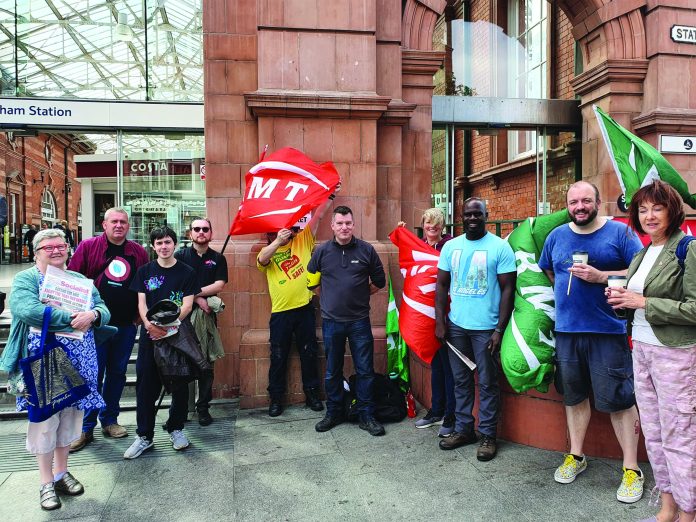Biggest dispute ‘in living memory’
A Midlands RMT member
Ballot papers have been landing on rail workers’ doormats since last week in what looks to be the biggest dispute facing the railway in a generation.
The government and railway employers are using the Covid recovery as their long-awaited excuse to go after our pay and conditions, which have been fought for and won by previous generations of railway workers over decades.
RMT has balloted 42,000 members across the train operating companies (TOCs) and Network Rail over three main issues: an imposed two-year pay freeze, a failure to guarantee no compulsory redundancies, and the employers’ failure to guarantee that there will be no changes to terms and conditions without union agreement.
Privatisation
The nationalised railways were run on a shoestring back in the 1990s. Despite the old jokes about British Rail sandwiches being ropey, the network achieved a reasonable level of efficiency in spite of decades of cuts.
Following privatisation, government subsidies ballooned from £1 billion in today’s money to £5 billion just before the pandemic – so much for the efficiency of the private sector!
Thanks to effective trade union organisation and rising passenger numbers, we managed to secure some significant improvements to our pay and conditions, and kept our pension scheme relatively safe during this time.
The pandemic hit passenger numbers, but these have now risen back to around 80% pre-Covid levels.
The Tories promise to tackle the climate emergency by getting people out of their cars and onto trains. But the railways are still running a less frequent service across the country, and the RMT has revealed the government’s plans to close thousands of ticket offices. The most expensive rail fares in Europe continue to rise.
You will not tempt people out of their cars if they are offered a less convenient service, with no staff to advise about ticket options. This is particularly the case for vulnerable or disabled people.
State-owned Network Rail, which owns the tracks and stations, wants to cut £2 billion in order to service its debts. Much of these were created when it took over from the disastrous Railtrack PLC, following several high-profile fatal incidents. On the other hand, the TOCs eye an opportunity to slash their operating costs and boost shareholder profits.
Profits
But what about the profits that have been sloshing around the rail firms’ bank accounts over the last few years? The truth is that, thanks to the corporate largesse of the Tories and New Labour, the railway has remained awash with cash since privatisation. So where has this money gone?
Yes, some workers have fought for and won improvements to their pay. But this pales into insignificance when you consider the obscene profits made by the various parasitic organisations, such as the Rolling Stock Leasing Companies (ROSCOs). These three companies, owned by banks, were set up by the Tories in the 1990s to own and lease the locomotives and carriages to the franchise-holding TOCs.
RMT research has shone a light on their profiteering. Last year alone, the ROSCOs paid out dividends of £950 million. Together with the TOCs, these private firms have extracted £8.3 billion from our railway network since privatisation. This money has been stolen from the community, railway workers and passengers, and funnelled into the pockets of wealthy shareholders.
This is why the Socialist Party calls for the renationalisation of the railways and transport network.
There can be no doubt what sort of jobs the Tories want on the railway of the future – they already exist.
Avanti West Coast cleaners
The workers who clean the trains on the prestigious and expensive Avanti West Coast service are outsourced and employed by Atalian Servest. This is a subcontractor working on behalf of Alstom, the train maintenance contractor.
These vital workers are paid just above the minimum wage, and receive no railway pension, sick pay or even free travel on the very trains they clean each day.
They have heroically struck for ten days so far in their struggle for a genuine living wage. Their employer is resisting paying them any more than an extra 6p an hour, never mind sick pay or anything else, despite recently paying out £10 million to their parent company in France!
Every penny of this obscene dividend was derived from the sweat of these ‘key workers’.
This is parasitic twenty-first century capitalism at its worst. With the grotesque situation at P&O Ferries still fresh in workers’ minds, there can be no doubt that we are approaching a confrontation with the employers which demands the most forceful and militant fightback in living memory.
The ballot closes on 24 May. RMT members should vote ‘yes’ to defend all rail jobs, pay and conditions!







